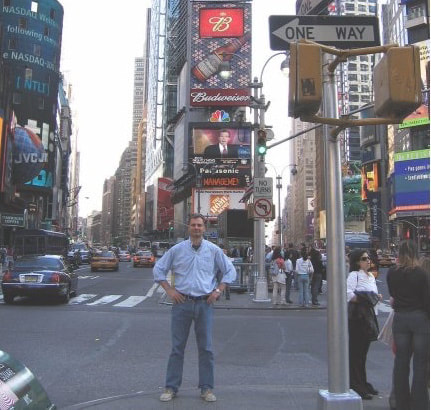My Green Card Story: From Frankfurt to New York
Getting Started
I had six months to enter the U.S. after receiving the temporary visa, or it would expire. I assumed that the visa could be re-issued (perhaps for a fee) but that I would face questions about how serious I was about the opportunity. For this reason, I wanted to move to the U.S. quickly.
|
Arriving at New York’s Kennedy airport for my interview visit in March 1998 started the final stage of the immigration process. Immigration officers examined my temporary visa (in a separate room, slightly intimidating), took finger prints, asked a few questions, and told me that the card would be mailed to the address I had provided. I now had a ‘I-551’ stamp in my passport, which served as temporary Green Card. It took about an hour before they let me go.
|
The plan for this visit was that one of the interviews in New York, Boston, Sarasota, and Irvine would land me a job. I thought to return to Germany and relocate within in a few weeks after first entry. Although I preferred to have a job confirmed by the time I moved, I was ready to relocate regardless.
After completing eight interviews with three companies and one recruiter, I received and accepted a job offer. New York would become my new home. Things had progressed remarkably fast.
Packing up and getting ready for my move was relatively easy. I had opted not to ask for financial relocation assistance so not to jeopardize receiving a job offer. Hence, I had to do the move on my own. Though on the other hand, I lived alone and moving an entire household wasn’t necessary. I also decided not to ship furniture or other large household items to New York (and thus accepted that I would have to purchase everything there). I sold some of my belongings and left the remainder in the basement of my parent's home. In parallel, I submitted my resignation at work and prepared to hand off my responsibilities. My department head had known for a while that I was leaving. With his support, I had interviewed in two of the company's U.S. offices, but by the time they were ready to continue the dialog it was too late. I am glad that they never offered me a job in the U.S. The company went out of business in 2001.
A few examples from my moving to-do list:
After completing eight interviews with three companies and one recruiter, I received and accepted a job offer. New York would become my new home. Things had progressed remarkably fast.
Packing up and getting ready for my move was relatively easy. I had opted not to ask for financial relocation assistance so not to jeopardize receiving a job offer. Hence, I had to do the move on my own. Though on the other hand, I lived alone and moving an entire household wasn’t necessary. I also decided not to ship furniture or other large household items to New York (and thus accepted that I would have to purchase everything there). I sold some of my belongings and left the remainder in the basement of my parent's home. In parallel, I submitted my resignation at work and prepared to hand off my responsibilities. My department head had known for a while that I was leaving. With his support, I had interviewed in two of the company's U.S. offices, but by the time they were ready to continue the dialog it was too late. I am glad that they never offered me a job in the U.S. The company went out of business in 2001.
A few examples from my moving to-do list:
|
My family was a little upset about my imminent departure. I probably left as quickly as I did so that I couldn’t be tempted to change my mind. For me, this wasn’t a temporary move to see ‘how it goes’. I was confident that I could get organized and adjust to work, culture, people, and the city. I was planning to stay. After all this time, I remain amazed about the determination I showed at the time. Shortly after arrival, I prioritized the following:
I had no plans to buy a car but got the license anyway since a more recent license issue date leads insurers and car rental companies to make assumptions about the apparent lack of experience on the part of the driver (even when that is not true and only interpreted that way because of the issue date).
- Obtained an employment confirmation letter from the company (useful for opening a bank account and when applying for an apartment rental)
- Requested a Social Security Number (requires passport and cash for a fee, is sent by mail); never share this number except when required by your employer, bank, or tax accountant (prevents identify theft)
- Began looking for a permanent place to live (using brokers, the Internet, personal contacts)
- Obtained official state identification, a driver license (requirements for the driving test vary from state to state)
I had no plans to buy a car but got the license anyway since a more recent license issue date leads insurers and car rental companies to make assumptions about the apparent lack of experience on the part of the driver (even when that is not true and only interpreted that way because of the issue date).
|
Since I needed a bank account, I asked my company's human resources department if they had a relationship with a particular bank. I received two recommendations but had no clue how difficult it is to open an account as a new resident. For all customers, banks and credit card companies verify the customer's credit history when opening new accounts. This is necessary to prevent fraud and also prescribed by regulators. There is a catch, though.
|
Having no Social Security Number and no credit history (let's say, you never lived in the country before) means that banks and credit card companies cannot verify the credit worthiness of a new customer. There is simply no historical data. This makes it difficult to get them to agree to open an account. However, if you cannot open accounts and begin using credit cards (or take out a loan), you cannot begin building a credit history. This history is evaluated based on, amongst other data points, historical account balances and reliability of past repayments. Luck was on my side again: a bank manager opened my account and agreed to wait for the requested Social Security Number I expected to receive within days. He also ensured that the account stayed open despite credit information services alerting the bank to my missing credit history.
Building a credit history can take a while. I took on a small debt (installment account for monthly subscription payments) and began using credit cards. I paid off monthly balances in full to avoid interest charges and show that I pay reliably. Additionally, I opened a savings account to build a cash balance over time by funding it automatically and on a monthly basis. Savings accounts, however, do not factor in a credit history. They are useful as an emergency fund and when applying for apartment rentals. Landlords commonly want to see how big a prospective tenant's cash reserve is, as an assurance that the tenant will be able to pay rent. I received many credit card offers by mail and limited myself to two since having too many cards can impact the credit rating negatively. One was from my bank, the other from Amex. By chance, I managed to circumvent the issue with my lacking credit history with Amex. I called them and explained that I am a German customer who is now a resident and requires a U.S. card (I had kept my German Amex card for this reason). I received a U.S. Amex a few weeks later.
The Social Security Number is also used when employers conduct background checks. This was not an issue for my first job in New York, since the company knew that I had no employment or credit history. As it is not common in the U.S. for employers to issue reference letters when an employee is leaving a job, and since some candidate resumes overstate qualifications, most hiring companies conduct background checks. This verifies past employment and academic degrees, and reveals potential issues with the law and credit ratings. The company wishes to validate that what the candidate said about themselves during interviews is true, and that their past does not exhibit issues with the law or debts (the latter is especially significant for people applying for roles in the finance industry). An offer letter for a position thus usually includes a statement such as “employment is contingent on background check”. Not passing the background check means not getting the job. This approach might look overly tentative to a candidate, but an offer letter is binding for the company. Unless a resume includes, for example, a non-existing academic degree, there should be no issue with passing the background check and the new hire can join the company.
A few more items (a mixed bag, actually...) about getting oriented in New York City:
Most financial issues (insurance, saving for retirement) are complex and require you to learn a lot. This may justify hiring a financial advisor.
Building a credit history can take a while. I took on a small debt (installment account for monthly subscription payments) and began using credit cards. I paid off monthly balances in full to avoid interest charges and show that I pay reliably. Additionally, I opened a savings account to build a cash balance over time by funding it automatically and on a monthly basis. Savings accounts, however, do not factor in a credit history. They are useful as an emergency fund and when applying for apartment rentals. Landlords commonly want to see how big a prospective tenant's cash reserve is, as an assurance that the tenant will be able to pay rent. I received many credit card offers by mail and limited myself to two since having too many cards can impact the credit rating negatively. One was from my bank, the other from Amex. By chance, I managed to circumvent the issue with my lacking credit history with Amex. I called them and explained that I am a German customer who is now a resident and requires a U.S. card (I had kept my German Amex card for this reason). I received a U.S. Amex a few weeks later.
The Social Security Number is also used when employers conduct background checks. This was not an issue for my first job in New York, since the company knew that I had no employment or credit history. As it is not common in the U.S. for employers to issue reference letters when an employee is leaving a job, and since some candidate resumes overstate qualifications, most hiring companies conduct background checks. This verifies past employment and academic degrees, and reveals potential issues with the law and credit ratings. The company wishes to validate that what the candidate said about themselves during interviews is true, and that their past does not exhibit issues with the law or debts (the latter is especially significant for people applying for roles in the finance industry). An offer letter for a position thus usually includes a statement such as “employment is contingent on background check”. Not passing the background check means not getting the job. This approach might look overly tentative to a candidate, but an offer letter is binding for the company. Unless a resume includes, for example, a non-existing academic degree, there should be no issue with passing the background check and the new hire can join the company.
A few more items (a mixed bag, actually...) about getting oriented in New York City:
- Carried passport until I obtained the driver license
- Created personal expense budget, tracked expenses, monitored cash flow
- Salaries are paid twice a month, many bills (power, gas, telecom, etc.) are paid monthly
- Signed up for employers' retirement benefits (pre-tax investment options known as 401k)
- Opened personal brokerage account to invest in the stock market
- Learned about salary deductions: taxes, social security, commuter benefits, voluntary insurance, etc.
- Studied health insurance coverage options (medical, dental provided by many employers)
- Hired tax accountant and located an attorney to create a last will and a living will
- Purchased a U.S. mobile phone
- Explored the city on foot to learn about neighborhoods, shops, parks, etc.
- Provided employer with required forms to certify employment eligibility and specify tax withholding
- Checked credit reports from the common credit bureaus annually for mistakes
- Located online forums and networking groups for expatriate/new immigrants
- Limited the advertising I receive by registering on do-not-call lists and mail opt-out lists
- Purchased identity theft protection
Most financial issues (insurance, saving for retirement) are complex and require you to learn a lot. This may justify hiring a financial advisor.
|
Your cultural adjustment warrants thoughtful consideration. Anyone moving to another country will experience the adjustment to culture, lifestyle, language, politics, economics, and society in their own way. There are commonalities between German and U.S. societies and one might think that the adjustment should have been easy. It was not.
|
Recognizing how cultural differences affect us is not trivial and occasionally perhaps even painful. There is a lot about America that I like and there are a few things that I dislike. I can say the same about Germany. Still, moving to New York was the right decision. The pro's continuously outweigh the con's. I am not homesick. I do not regret what I gave up to start again. Coming here was right. But there were the occasional challenges.
An example: one cliché about Americans is their alleged superficiality. They greet one another by saying 'how are you doing'. Or they say 'let's do dinner soon'. Some Europeans take these statements literally and share their aches and make specific plans for a meal. This can cause confusion, since (often) the greeting is simply a polite phrase and the invitation is a courtesy. Such exchanges are not evidence of superficiality. They are part of a different social protocol. It took me a while to become comfortable with its finer distinctions. My personality certainly played a role in how I learned to adjust. Yet, many nuances relating to cultural, social, and interpersonal expectations and behaviors are informed by national origin. Intercultural differences can lead to misunderstandings, often provide learning opportunities, and occasionally cause laughter (my American pop-culture knowledge gap can lead to quite funny misunderstandings). The main point here is that culture does not adjust to the individual. It is the individual who adjusts to the culture. And that takes time and a growth-oriented mind.
An example: one cliché about Americans is their alleged superficiality. They greet one another by saying 'how are you doing'. Or they say 'let's do dinner soon'. Some Europeans take these statements literally and share their aches and make specific plans for a meal. This can cause confusion, since (often) the greeting is simply a polite phrase and the invitation is a courtesy. Such exchanges are not evidence of superficiality. They are part of a different social protocol. It took me a while to become comfortable with its finer distinctions. My personality certainly played a role in how I learned to adjust. Yet, many nuances relating to cultural, social, and interpersonal expectations and behaviors are informed by national origin. Intercultural differences can lead to misunderstandings, often provide learning opportunities, and occasionally cause laughter (my American pop-culture knowledge gap can lead to quite funny misunderstandings). The main point here is that culture does not adjust to the individual. It is the individual who adjusts to the culture. And that takes time and a growth-oriented mind.
Reading is clearly no substitute for a first-hand experience and immersion in a new culture. However, there are a few books that helped me understand U.S. society, culture, history, work, and life (in recommended sequence):
|
If you read German: Aufbruch ins Land der unbegrenzten Möglichkeiten by Heiko & Gisela Spallek and Bildung by Dietmar Schwanitz (section on culture differences)
* * *
It rained continuously and hard during my first weekend living in New York City in the summer of 1998, making it unattractive to leave the Bed & Breakfast. I wrote to my mother and a close friend since I had the urge to share what I had experienced during the first five days. A myriad of emotions came and went. I felt uprooted. Concerned about getting organized. Stressed about finding a place to live. On the positive side, though: my first week in the office went well. The new colleagues all seemed nice. I thought: "This is right. I need to be here." Now that I think back, it seems as if curiosity and determination made me look at the future not with fear, but with optimism. 1998 may have been the year I grew up.
Moving to the U.S. and building a new life became a catalyst for my personal and professional growth. One other aspect of my Green Card story that I'd like to share is about me going back to school.







